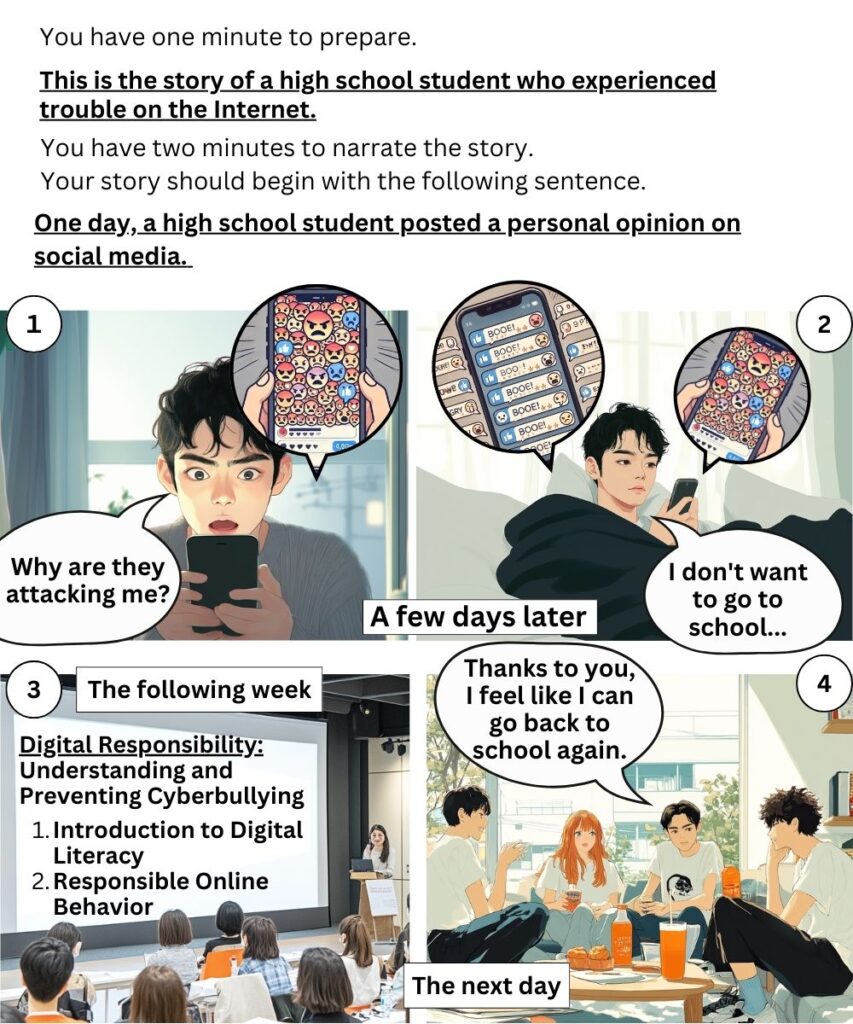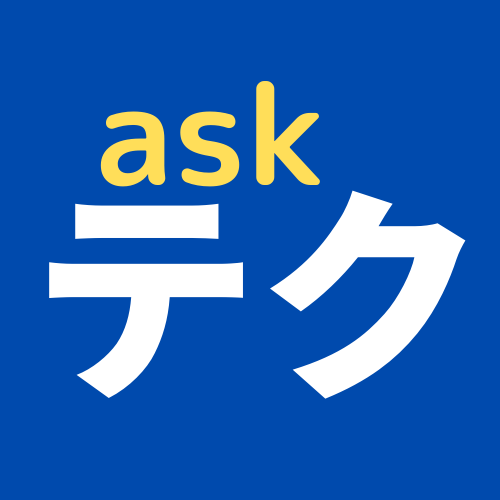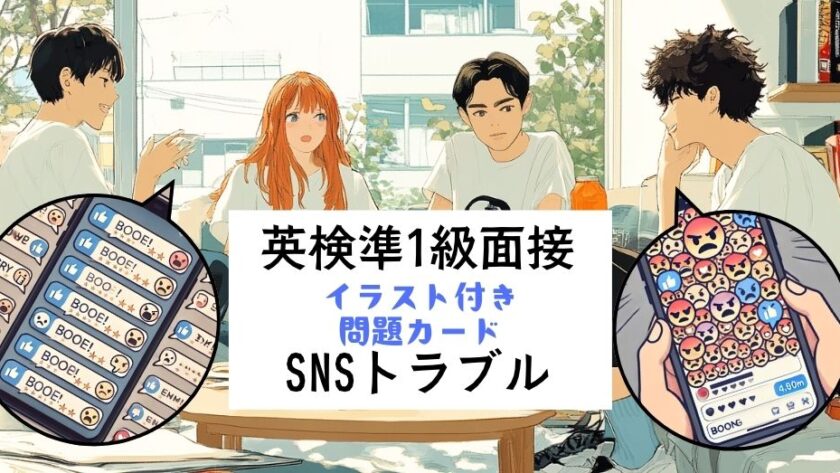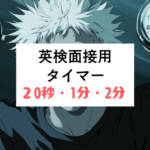メタディスクリプション:
実際の出題形式(問題カード)で英検準1級の面接練習を独学できるページです。
2024年度リニューアル対応!
所要時間:概ね8分
質問概要
ナレーション内容を考える(1分間)
イラストの内容を説明するナレーションを考える
ナレーション(2分間):ナレーションを始める
※2分以上続く場合は、途中でも中止させられるので注意
Q&A(No. 1):イラスト関連の質問
イラストに関連した質問。「問題カード」を見ながら解答できます。
※登場人物が考えている事などを聞かれます。
Q&A(No.2, No. 3)
問題カードに関連した、受験者の意見を問う質問
Q&A(No. 4)
問題カードのトピックに少し関係のある質問。受験者の意見を問う質問
※この<No. 4>質問文に「導入文」が追加されました。
問題カード

ナレーションと質問
ナレーション指示
<指示>Look at the pictures carefully and read the directions silently for one minute.(1分間)
<指示>Now, please begin your narration.(2分間)
Question No.1
Please look at the fourth picture. If you were one of the classmates visiting the student, what would you be thinking?
Question No.2
Do you believe that workshops on digital responsibility are effective in preventing cyberbullying?
Question No.3
Do you think social media platforms should do more to prevent online harassment?
Question No.4
Recently, there has been growing concern about the impact of social media on young people’s mental health. Do you believe that parents should monitor their children’s social media activity?
質問音源チャレンジ
本番のように、英語の質問を聞いて答える練習をしてみましょう。
ナレーション準備
ナレーション開始
Question 1 mp3
Question 2 mp3
Question 3 mp3
Question 4 mp3
解答例
ナレーション例
ナレーション全文聞き流し:
<1> One day, a high school student posted a personal opinion on social media. Unfortunately, the post quickly spread, and the student became a target of online harassment. Shocked by the negative reactions, the student wondered why so many people were attacking him.
ある日、高校生がソーシャルメディアに個人的な意見を投稿した。残念ながら、その投稿は瞬く間に広まり、その学生はオンライン上での嫌がらせの標的となった。否定的な反応にショックを受けた学生は、なぜこれほど多くの人々が自分を攻撃しているのか疑問に思った。
「Unfortunately =残念ながら」のように、ナレーションが面白くなる副詞をいくつか押さえておこう
1. Regrettably – 残念ながら
2. Sadly – 悲しいことに
3. Unhappily – 不幸にも
4. Tragically – 悲劇的に
5. Disappointingly – 期待外れに
<2> A few days later, overwhelmed by the constant stream of hurtful comments, the student began avoiding social interactions. The situation worsened, and the student told his parents that he didn’t want to go to school anymore.
数日後、絶え間ない中傷コメントに圧倒されたその学生は、人との交流を避けるようになった。状況は悪化し、学生は両親に学校に行きたくないと伝えた。
誹謗中傷を表す表現:
1. Malicious remarks – 悪意のある言葉
Overwhelmed by the constant stream of malicious remarks, the student began avoiding social interactions.
2. Hateful messages – 憎しみを込めたメッセージ
The student was overwhelmed by the endless flood of hateful messages.
3. Derogatory comments – 軽蔑的なコメント
The student began avoiding social interactions due to the barrage of derogatory comments.
4. Insulting remarks – 侮辱的な発言
The constant stream of insulting remarks made the student withdraw from social activities.
5. Slanderous words – 中傷的な言葉
The student was overwhelmed by the slanderous words being directed at them.
<3> The following week, concerned teachers and parents organized a workshop at the school on digital responsibility, focusing on understanding and preventing cyberbullying. The workshop emphasized the importance of digital literacy and responsible online behavior to help students navigate the internet safely.
翌週、心配した教師と保護者が協力し、デジタル責任についてのワークショップを学校で開催した。このワークショップでは、サイバーいじめの理解と防止に焦点を当て、インターネットを安全に利用するためのデジタルリテラシーと責任あるオンライン行動の重要性が強調された。
ネット社会で身に付けるべき知識
digital literacy – デジタルリテラシー
responsible online behavior – 責任あるオンライン行動
privacy protection – プライバシー保護
recognizing cyberbullying – サイバーブリングの認識
safe social media usage – 安全なソーシャルメディアの利用
avoiding harmful content – 有害なコンテンツの回避
reporting inappropriate behavior – 不適切な行為の報告
understanding digital footprints – デジタルフットプリントの理解
critical thinking online – オンラインでの批判的思考
protecting against phishing and scams – フィッシングや詐欺の防止
<4> The next day, a group of classmates visited the student to offer support and encouraged him to return to school. With this support, the student felt more confident and ready to go back. This experience helped everyone understand the serious effects of cyberbullying and the importance of supporting each other both online and offline.
その翌日、クラスメートのグループが学生を訪れ、支援を申し出て学校に戻るよう励ました。この支援を受けて、学生は自信を取り戻し、再び学校に通う準備ができた。この経験を通じて、誰もがサイバーいじめの深刻な影響と、オンラインでもオフラインでも互いに支え合うことの重要性を理解した。
Question 1 解答例
質問:4枚目の写真を見てください。あなたがその学生を訪問したクラスメートの1人だったら、あなたは何を考えていますか?
If I were one of the classmates, I would be thinking about how important it is to show support and kindness to someone who has been hurt by cyberbullying. I would also consider how we can create a more positive and inclusive environment at school to prevent such situations from happening again.
もし私がそのクラスメートの1人だったら、ネットいじめで傷ついた友達に支援と優しさを示すことの重要性を考えているでしょう。また、同じようなことが2度と起こらないように、学校でよりポジティブで包容力のある環境を作る方法についても考えるでしょう。
Question 2 解答例
デジタル責任に関するワークショップは、ネットいじめの防止に効果的だと思いますか?
Yes, I believe that workshops on digital responsibility are effective in preventing cyberbullying because they educate students about the consequences of their online actions and provide strategies for handling negative situations. These workshops can help create a more aware and responsible online community.
はい、デジタル責任に関するワークショップは、ネットいじめを防ぐのに効果的だと思います。なぜなら、ワークショップが生徒にオンラインでの行動の結果について教え、否定的な状況に対処するための戦略を提供するからです。これにより、より意識の高い責任あるオンラインコミュニティが形成されるでしょう。
No, I don’t think workshops on digital responsibility alone are enough to prevent cyberbullying. While they can raise awareness, they might not be effective unless followed by ongoing support and a strong school policy that enforces responsible behavior online.
いいえ、デジタル責任に関するワークショップだけではサイバーブルーイングを防ぐには十分ではないと思います。意識を高めることはできますが、継続的な支援や責任ある行動を強化する強力な学校方針がなければ、効果が薄いかもしれません。
Question 3 解答例
ソーシャルメディアプラットフォームは、オンラインハラスメントを防ぐためにもっと努力すべきだと思いますか?
Yes, I think social media platforms should do more to prevent online harassment. They could implement stricter policies against harmful behavior, improve their reporting systems, and promote a culture of respect among users. This would help reduce the occurrence of cyberbullying.
はい、ソーシャルメディアプラットフォームは、オンラインでの嫌がらせを防ぐためにもっと努力すべきだと思います。有害な行動に対するより厳格なポリシーを実施し、報告システムを改善し、ユーザー間で尊重する文化を促進することができます。これにより、ネットいじめの発生を減らすことができます。。
No, I don’t think social media platforms can solve the problem of online harassment entirely. While they can improve their policies and tools, the responsibility also lies with users to act responsibly and with respect. Education and awareness are crucial to tackling this issue.
いいえ、ソーシャルメディアプラットフォームだけでは、オンラインでの嫌がらせの問題を完全に解決することはできないと思います。ポリシーやツールを改善することはできますが、責任と敬意を持って行動する責任もユーザーにあります。この問題に取り組むためには、教育と意識向上が不可欠です。
Question 4 解答例
近年、ソーシャルメディアが若者のメンタルヘルスに与える影響について懸念が高まっています。親は子供のソーシャルメディア活動を監視するべきだと思いますか?
Yes, I believe parents should monitor their children’s social media activity to some extent. Monitoring can help parents guide their children in making safe and responsible choices online, and it can also allow them to intervene if they notice any signs of cyberbullying or other harmful behavior.
はい、親はある程度、子どもたちのソーシャルメディア活動を監視するべきだと思います。監視することで、親は子どもたちがオンラインで安全で責任ある選択をするよう導くことができ、サイバーブルーイングや他の有害な行動の兆候があれば介入することも可能です。
No, I don’t believe that parents should closely monitor their children’s social media activity. Instead, parents should focus on building trust and open communication with their children, so they feel comfortable discussing any issues they encounter online.
いいえ、親が子どもたちのソーシャルメディア活動を厳しく監視するべきではないと思います。その代わりに、親は子どもたちとの信頼関係を築き、オープンなコミュニケーションを重視すべきです。そうすることで、子どもたちはオンラインで遭遇する問題について安心して相談できるようになるでしょう。
面接練習はask本校にお尋ねください:無料体験レッスン予約
こちらの投稿もおススメです:英検準1級面接問題カード|在宅勤務トピック質問と回答例
SNS拡散・ジョーク
1. The Viral Recipe
- Why did the chef’s recipe go viral on social media?
Because it had just the right amount of “likes” and “shares”! - なぜシェフのレシピがSNSでバズったの?
それは「いいね」と「シェア」がちょうどいい量だったからさ! - 解説: 「いいね」と「シェア」が多ければ多いほど、投稿が拡散されやすくなるというSNSの仕組みを料理のレシピにたとえているジョークです。
2. The Oversharing Friend
- Why did the oversharing friend get fewer followers?
Because they were posting too much “life seasoning.” - なぜ過度にシェアする友達がフォロワーを減らしたの?
人生の「スパイス」をかけすぎたからさ! - 解説: 人生の「スパイス」(出来事や感情)を過剰に投稿することで、かえってフォロワーを失うというSNSでよくある現象をジョークにしています。
3. The Hashtag Overload
- Why did the post crash the app?
Too many hashtags caused a “tag-nado”! - なぜ投稿がアプリをクラッシュさせたの?
ハッシュタグが多すぎて「タグ竜巻」が起きたんだよ! - 解説: ハッシュタグをつけすぎると、逆に混乱を招くという状況を「竜巻」(tornado)になぞらえたジョークです。
4. The Instant Influencer
- How did the cat become an overnight influencer?
It had the purr-fect “meow-ment” on camera! - どうしてその猫が一夜にしてインフルエンサーになったの?
カメラで「最高の瞬間」(meow-ment)を捉えたからさ! - 解説: 「最高の瞬間」というフレーズを「猫の鳴き声(meow)」と組み合わせて、SNSでの人気爆発をユーモラスに表現しています。
5. The Like Button Addiction
- Why did the like button go to rehab?
It couldn’t stop being pressed! - なぜ「いいね」ボタンがリハビリに行ったの?
押されるのがやめられなかったんだよ! - 解説: 「いいね」ボタンが過剰に押される状況を、依存症になぞらえたユーモラスなジョークです。




